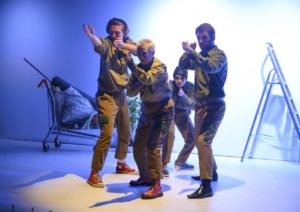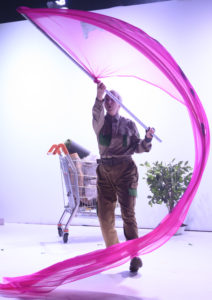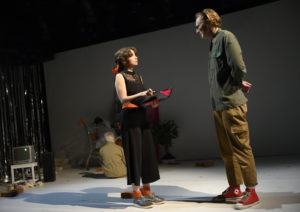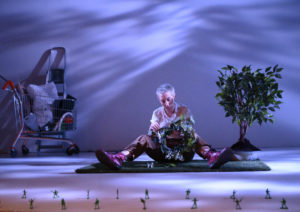Júlia Levai is the director of our upcoming show, ‘The Prince of Homburg’. In this radical & modern retelling of Kleist’s classic , the story is placed in 2019, into a world which could be ours, but somehow feels like a dream. Freely adapted from Neil Bartlett’s translation with a gender-swapped lead, this production asks what we do when the reality around us becomes confusing and chaotic.
Tell us a little about yourselves as a company. What do you aim to achieve with this show?
“We are a collective of young theatre-makers and we are beyond excited to bring our show, ‘The Prince of Homburg’ to The Space as for most of us it will be our first show since finishing our training in different drama schools, making this a really invaluable and crucial opportunity to start making our own work. We are hoping this might be a start of future collaborations. I originally collaborated with Zoe (designer) on this project as part of LAMDA’s MA Directing Season and now with a new cast we are hoping to explore the piece further and bring something for the audiences of The Space which feels playful, but also political aiming to strike a cord and raise questions in anyone who comes to see it.”
The show will be coming up soon, but what has the most memorable moment of the process of creating this show been so far?
“So much! We have been lucky enough to use the rehearsal spaces at LAMDA and at The Space, but there were some occasions when we found ourselves rehearsing in dressing rooms and my living room so we had to be creative and use the constraints of the space almost as exercises so the actors can now confidently play certain scenes as if the floor is lava or in a tiny square. We also have a bit of movement in the show and it’s been great to devise those bits. One thing we have been keen and hopefully will get to do before the show is to go as a company to an escape room as ‘ensemble building’.”

You have changed the setting of the show from 1675 to 2019, but why is it so important to bring this show to life right now, in light of today’s political climate?
“It’s been really interesting actually, because the more we have been working in rehearsals the more resonance we are finding with our current socio-political climate. Kleist’s play explores social responsibility, questions of personal being mixed up with political and whether the rules and systems we live by built on old laws are still fitting or whether we do need people like Homburg who following an impulse goes against orders, but with that brings change? We found that living in this uncertain political climate where we seemed to be always blaming others, not taking responsibility and at a time of fake news there is so much resonance with Kleist’s text that it made sense to us to place the piece into 2019 as a way to reflect that and also to allow an audience to connect to the characters and the story more by getting rid of the period and the dust around the text.
It’s also essentially on a personal level a coming of age story of the young characters from falling in love, to recognising and facing the idea of death and taking up agency to protest against the system. What’s really brilliant in Kleist’s writing is that there is all the political implications, but it also allows for real connections to these characters who are going through all the things that we are or have whether it’s 1675 or 2019.

What message are you attempting to convey with the portrayal of the Prince of Homburg, a headstrong military leader questioning his own fear of death, as a female?
Homburg is a beautifully complex character who goes through an a huge journey from real highs to low – from falling in love to aspiring for power and then later facing death and the complexities of the system she lives in. I found it important on a political level to have Homburg as a woman because by placing the piece into 2019 the politics of a woman being impulsive -and actually successfully – lead the army and aspiring for power seemed to be a much more exciting premise than if Homburg was played by a guy. I think there is a real issue with gender equality still at work places and what we wanted to explore with this piece is how still today women seem to be allowed to be managers, but you rarely see women becoming CEOs of big companies. I remember it being headlines a few months ago that not one country is set out to achieve gender equality before 2030. It really hit me and made this play feel like a strong parallel and something we were passionate about exploring.
I also think it is still so rare that we see really complex and flawed women on stage. Homburg is by no means perfect (How could she?) but she has a real drive and this beautiful naivety towards people – she really trust the people around her which is extremely rare. We joked about it in rehearsals how this is our slightly odd, German version of Hamlet as there are so many resonance between the two characters. I think it’s also really important in our production that Natalie, Homburg’s love interest, gets a much bigger role and grows from being the quiet princess and love interest into a strong and confident leader to stands up against the system and demand change. I think it’s really exciting to see two widely different female characters both growing up throughout the play and somehow finding one another through that journey.

The idea of suicide is contemplated in the show, what was the company’s reaction to themes of suicide and how did you all approach this sensitive topic?
It’s interesting because what we have found is that actually what Homburg is dealing with and what causes most of her anxieties is the sudden realisation of how none of us our invincible and her trying to work through the sheer panic of it once the idea of death appears as a real possibility. So for us the way of approaching this topic was by looking at it from a coming of age point of view and as an essential part of her growing up.
A question that you ask the audience is: “do we stand up for what we believe in or passively go on as before?” Do you think this production is a way of standing up for what you believe in or is it a call to action for the audience to do so?
I guess the making of this show so far has allowed us to really question the rules we live by, our social responsibilities and the political climate we currently live in. It would be amazing if watching the show could raise some of these or similar questions and ideas in the audience members.
